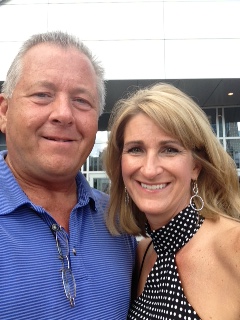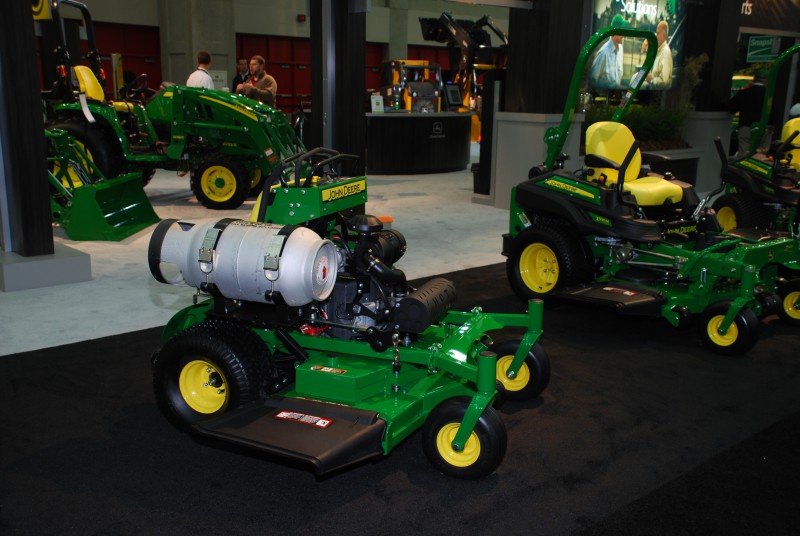David Wood of Smitty’s Lawn & Garden agreed to purchase a Husqvarna commercial zero-turn mower that had been converted to propane as a demo unit.
“I said, ‘Sure. Why not?’ I’m a good partner with Husqvarna. What I didn’t realize was that now I had bought a propane mower and my mechanics couldn’t work on it,” Wood says. He is one of the owners of the dealership based in Olathe, Kan., which is just outside the Kansas City, Mo., metro area. “I committed to demo and sell it, but I didn’t have any way to take care of customers. Now, 2 years down the road, I’m a whole lot smarter.”
Wood says the issue for him and many dealers is they are the “middle men” of introducing and servicing a new product for the landscaping industry, even though the technology has been proven for years in other industries. “Nobody has ‘step 1-10’ for how to do it,” Wood says. “It’s taken me an enormous amount of time to figure out how we can sell propane equipment.”
Wood talked to his manufacturers and researched technologies to ensure his dealership became the local experts. He decided to not only demo a unit, but to become the exclusive Kansas City area dealer for the EnviroGard conversion kit, the technology used by Husqvarna. And, he went a step further and signed on as one of three owners of Tech Services, the exclusive distributor, training and support operation for EnviroGard.

David and Christine Wood own Smitty’s Lawn and Garden Equipment of Olathe, Kan.
“I believe so much in the paradigm for the industry that I believe it’s a business opportunity for me,” Wood says of his partnership in Tech Services.
Wood says a key factor in his decision to move forward with EnviroGard was its tuner kit. “Without a tuner kit, you’re tuning it by ear based on how the engine sounds. If you think it’s running lean, then you adjust to give it more fuel but then you may be using more fuel than you need. We believe you can get a 1:1 ratio in terms of the machine’s performance compared with gasoline if you tune it the way it needs to be tuned. That’s when the industry is really going to sit up and take notice — when they see the real dollar savings.
“When you look at how the industry has changed in the last 10 years, it was about bigger machines and bigger engines. We’ve gotten about as big as you can get,” Wood says. Now, he says landscapers will build efficiencies through fuel savings. “That’s where propane becomes the answer.”
Wood offers other reasons why he expects a shift to propane in the landscaping industry and eventually for homeowners, too. “The fuel dollar savings is #1 and #2 is that there is no more bad fuel issues. I can’t tell you how many conversations we’ve had in my service department when customers have said they’ve been mowing for 30 years and they’ve never had so many engine issues. That’s a direct correlation between ethanol in gas.
“I think it will be the fuel of choice for commercial customers and residential customers will follow,” Wood says.
Wood’s team completed training on the EnviroGard conversions in February of 2013. “We’ve converted customers here and there. We had one landscaper buy several mowers that we converted and it’s gone really well. We’re seeing end users wanting to know more about it, and we’re getting ready for more conversions this year.”
Wood has also started marketing his conversion center. He developed a six-page, full-color brochure that he mailed to his top commercial landscapers and then followed up with sales calls. “It took a little while to get feedback from our customer base, but now it’s really starting to ‘get legs,’ ” Wood says.
He does have this warning.
“We’re only going to get one shot at this. If we don’t do this right, the landscapers are going to dump propane and we’ll never get them back,” he says.
John Deere Introduces Propane Conversion Kit
Propane mowers have been available for some time now. The first propane mower was patented in 1996 by Onyx Environmental Solutions and Dixie Chopper introduced its first propane mower in 2006. John Deere gave the equipment a boost when, this past October, it announced its dealer-installed propane option for its ZTrak zero-turn mowers, Quik Trak stand-on mowers and commercial walk-behind mowers. Deere is using the EnviroGard kit. EnviroGard is the brand name for the Onyx technology.
At GIE+Expo in October, John Deere announced its dealer-installed propane option for its ZTrak zero-turn mowers, Quik Trak stand-on mowers and commercial walk-behind mowers.
“We decided to move forward with a propane solution in response to growing customer demand. Although still small, propane is a growing segment in the market, with more and more customers attracted to not only the money savings with propane, but also the ‘green’ aspect of the fuel” says Nick Minas, product manager for John Deere commercial mowing.
“EnviroGard’s expertise allowed us to quickly develop, test and bring to market a propane solution that is specifically designed to fit select John Deere ZTrak, Quik Track and walk behind products. In addition, the EnviroGard solution has been approved by PERC (Propane Education & Research Council) to be eligible for all potential rebates normally reserved for factory installed kits,” Minas says.
As part of PERC's program, a landscape contractor may receive $1,000 per each qualified new propane-fueled mower purchased and $500 for each conversion of a qualified mower.
John Deere dealers will need to complete certification training conducted by Tech Services. Dealers cannot order or install the kits until the training is complete.
Making the Technology Mainstream
Deven Hurst is president Tech Services, “Our company specializes in the service side. Selling the product can be done by anyone, but service is what the industry needs.”
Smitty’s Lawn and Garden Equipment developed a six-page, full-color brochure to market his dealership as a propane conversion center.
Hurst worked for Snapper and Stihl before founding Tech Services 4 years ago. He’s one of the owners of Tech Services along with Wood and Roger Simons. Simons led Stihl’s technical services and quality control department for 25 years. The company has been supporting EnviroGard for 2 years and Hurst says the John Deere announcement is significant because now dealers can convert 28 models to propane, as opposed to just one or two. “This makes conversion much more palatable for the dealer and the OEM — and the end user gets to pick the right product for them.”
The John Deere implementation also includes specific engine brackets for each kind of machine. “It’s a ‘plug and play’ system that mitigates risks for dealers.” For instance, he says the kit and bracketing takes into account weight and balance so that a converted machine meets the manufacturer safety requirements. Hurst says EnviroGard is developing similar conversion systems with other manufacturers. Also, he says the EnviroGard option allows dealers to work with any propane supplier they choose. Other conversion kits are linked to propane purchase arrangements.
He agrees with Wood and says the propane conversion model had gaps. Early on, dealers were being asked to promote a product, often without the right training and follow-on support. “Dealers don’t have a stake in the savings, so conversions were more of a cost and trouble to them.”
Kawasaki has been working PERC to educate their dealers about converting gas mowers to propane. Dealers can access educational and training resources through PERC, including an off-road engine training manual and a brochure on propane mowers that offers troubleshooting tips.
What dealers do have a stake in is serving customers, unhappy customers, whose equipment needs engine repairs due to gasoline issues. “The #1 service ticket in most repair shops is related to the fuel system because ethanol is so corrosive. It’s a nuisance repair for everyone,” Hurst says.
Dealers can use propane conversions to their advantage, he says. “Dealers are getting on board now. They see it as a differentiator in the market since it’s early.” Still, he describes the status as “Ground Zero” in terms of dealer engagement. “Without them, the whole thing is just a science experiment.”
Hurst points to Wood as a dealer who is leading the way. “He’s one of the guys who understands that this could be a big change for his dealership. He realized he had bought a unit without really understanding it. He went back and started to document the process. He is responsible in terms of the product he sells to end users because he knows they make a living using that equipment. He also saw the benefits of what it could bring to his customers and is now having those ROI conversations with them.”




.webp?height=254&t=1755550502&width=198)



